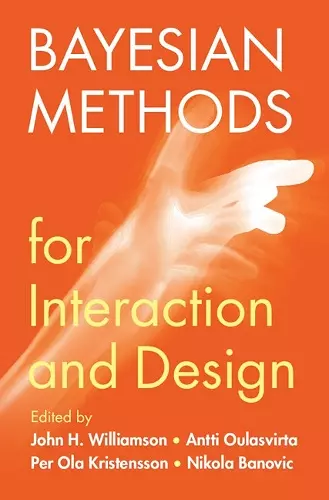Bayesian Methods for Interaction and Design
Antti Oulasvirta editor Per Ola Kristensson editor John H Williamson editor Nikola Banovic editor
Format:Paperback
Publisher:Cambridge University Press
Published:25th Aug '22
Currently unavailable, and unfortunately no date known when it will be back
This paperback is available in another edition too:
- Hardback£94.00(9781108834995)

Introduces Bayesian methods and their implementation in application ranging from pointing-based interfaces to modelling cognitive processes.
Bayesian modelling is powerful and an increasingly practical tool for thinking about HCI. Intended for researchers and practitioners, this book introduces Bayesian modelling and shows how it can be brought to bear in interaction design applications ranging from improving pointing-based interfaces to modelling the cognitive processes of users.Intended for researchers and practitioners in interaction design, this book shows how Bayesian models can be brought to bear on problems of interface design and user modelling. It introduces and motivates Bayesian modelling and illustrates how powerful these ideas can be in thinking about human-computer interaction, especially in representing and manipulating uncertainty. Bayesian methods are increasingly practical as computational tools to implement them become more widely available, and offer a principled foundation to reason about interaction design. The book opens with a self-contained tutorial on Bayesian concepts and their practical implementation, tailored for the background and needs of interaction designers. The contributed chapters cover the use of Bayesian probabilistic modelling in a diverse set of applications, including improving pointing-based interfaces; efficient text entry using modern language models; advanced interface design using cutting-edge techniques in Bayesian optimisation; and Bayesian approaches to modelling the cognitive processes of users.
'More than half a century since network flow theory was introduced by the 1962 book of L.R. Ford and D.R. Fulkerson, the area is still active and attractive. This book, based on course materials taught at Stanford and Cornell Universities, offers a concise and succinct description of most of the important topics, as well as covering recent developments. Its use in graduate courses related to algorithms and optimization is highly recommended.' Toshihide Ibaraki, Kyoto College of Graduate Studies for Informatics
'A succinct and very readable account of network flow algorithms covering the classics and the latest developments. The perfect book for a course on network flow algorithms and a reference for the state of the art. It will be a frequently used addition to my bookshelf.' Kurt Mehlhorn, Max-Planck Institute for Informatics
'This high-quality book provides exhaustive references that will serve anyone deeply interested in interface design and will be helpful to those looking to get into user experience and/or the design of interfaces. … Highly recommended.' J. R. Lauber, Choice
ISBN: 9781108792707
Dimensions: 228mm x 151mm x 20mm
Weight: 550g
374 pages